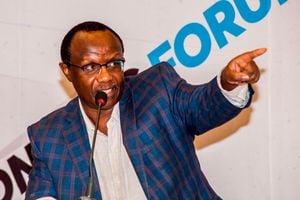Offering hope to children with neurological disorders

An occupational therapy session at Ubuntu Life Foundation in Maai Mahiu, Naivasha.
What you need to know:
- Neurological disorders are diseases of the central and peripheral nervous system - brain, spinal cord, cranial nerves, peripheral nerves, nerve roots, autonomic nervous system, neuromuscular junction and muscles.
- The disorders include epilepsy, Alzheimer disease and other dementias, cerebrovascular diseases including stroke, migraine and other headache disorders, multiple sclerosis, Parkinson's disease, neuroinfections, brain tumours, traumatic disorders of the nervous system due to head trauma, and neurological disorders as a result of malnutrition.
When Tabitha Wairimu welcomed her 13th child in 2011, she was over the moon. But soon, she realised that little Halima Wanja, just like one of her elder sisters, was epileptic. "It was disheartening to learn that she was epileptic, but it wasn't a new path for me as I was already raising another epileptic daughter,” says Tabitha with a distant smile.
"With my first daughter, I really struggled trying to figure out what the issue was. We got some respite at Nakuru Provincial Hospital, but medication was too costly, and we unfortunately lost her four years ago when she was aged 25," recounts Tabitha, a resident of Maai Mahiu in Nakuru County.
Now the only thing that keeps her going, she says, is seeing the little milestones that Halima hits. "The journey with Halima has been quite different as compared to her sister’s. This, says Tabitha, is because, when she (Halima) experienced her first seizure, Tabitha knew exactly what it was. She took her to Ubuntu Life Foundation, a non-governmental organisation based in Maai Mahiu that offers education and healthcare to children with special needs.
“I enrolled her at Ubuntu when she was barely two years old, and I have seen her achieve commendable milestones, all thanks to medication and speech therapies offered at the centre. Halima no longer has seizures, and she can now talk and read, albeit incoherently. I am also able to afford her medication since we get it here at a subsidised rate. In total, I pay 5,000 per term, inclusive of meals, transport, medication and school fees," she notes.
"My greatest joy is that I can go hustle knowing that Halima is in safe hands. With the other child, it was difficult to even go out and do casual jobs as no one was willing to take care of a child with a disability.”
When the Healthy Nation team visited Ubuntu Life Foundation, it met Isaac Kangethe, a farmhand and parent at the centre. He recounted his journey taking care of a child suffering from cerebral palsy.
"My son was delivered through caesarean section at the Naivaisha District Hospital. After birth, little Peter did not cry though the doctor did not raise any alarm, and so we were discharged. It was not until the age of seven months that my wife discovered Peter had delayed milestones," he says.
They started looking for specialised care and it was at Thika Hospital Level Five that Peter was diagnosed with cerebral palsy. "The charges were very high and we could not afford the prescribed medication, so we went back home. I was running a small eatery while my wife was taking care of Peter,” says Isaac
Around the same time, a neighbour approached him and told him to consider enrolling Peter at Ubuntu."
Isaac explains that at first his wife was not for the idea because she knew Ubuntu was a foundation for children with disabilities, but she believed her child did not have any special needs. It took the intervention of Ubuntu management to convince her. "Looking back, it was the best decision ever since it was at the foundation that Peter was given a wheelchair for free. He has also made some remarkable progress as he can sit still without falling forward or backwards, all thanks to occupational therapies, " he explains.
According to Jeremiah Kuria, the executive director and co-founder of Ubuntu, the dream of the foundation began when he was working as an assistant manager at Maai Mahiu children's home. "I discovered there was an evident gap for children who were abled differently, and in the line of duty, I met Zane Wilemon from Texas who had come to visit the home. We forged a friendship, and I told him about my dream to build a space for children with disabilities, a dream he also shared," he notes.
In 2007, Ubuntu opened its doors to nine children with disabilities. It was the first special needs school in Rift Valley region. "Since then, the Ubuntu family continues to grow, and we currently have 65 children with different neurological disorders enrolled in our school. Some 62 are in active therapy, but conclusively, we have 255 patients, including adults, from within this community who come to us for neuro-therapy," he offers, urging the government to support organisations that deal with people living with disabilities as they are also citizens with equal rights.
Neurological disorders are diseases of the central and peripheral nervous system - brain, spinal cord, cranial nerves, peripheral nerves, nerve roots, autonomic nervous system, neuromuscular junction and muscles. According to the World Health Organization, the disorders include epilepsy, Alzheimer disease and other dementias, cerebrovascular diseases including stroke, migraine and other headache disorders, multiple sclerosis, Parkinson's disease, neuroinfections, brain tumours, traumatic disorders of the nervous system due to head trauma, and neurological disorders as a result of malnutrition.
Dr Peris Njuguna is the only neurologist in Maai Mahiu region and is based at Ubuntu, where she works alongside a nutritionist, a nurse and a lab technician. She also works virtually with doctor-partners from the US. "They recommend and prescribe medications for our patients, but they also come to the country three times a year to monitor the progress," she says. "Epilepsy is a largely neglected disease in the country, yet it affects a sizeable number of people. There is also too much stigma around the disease. Most of my patients actually had to drop out of school due to the stigma they faced whenever they had seizures. We also have a limited number of neurologists, and the government should do more to address this acute shortage."
According to Dr Sultani Matendechero, the deputy director general at the Ministry of Health, the government is putting deliberate measures in place to create awareness about these disorders as well as increase relevant personnel.





